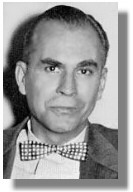

Dr. Delwin Dusenbury
Temple University Official Photo
1957
![]()
Dr. Delwin Bennett Dusenbury, 88, professor emeritus and retired professor of Communications at Temple University (he taught radio and television writing and performance) for a quarter of a century, passed away on Thursday, June 27, 2002. He taught, produced and performed drama for theater, radio and television.
Dusenbury was born in Milwaukee, Wisconsin on December 26, 1913 and attended vaudeville performances as a child. He fell in love with the theater. Delwin earned his B.A. at the University of Wisconsin. The next year, he received his M.A. from the University of Maine. A decade later, in 1947, Dusenbury was awarded his Ph.D. from the University of Minnesota.
His dissertation was "A Study of Comedy in the American Theater Represented in the Productions of Native Comedy in New York City from 1900 to 1920." Before joining the Temple faculty in 1955, Delwin taught at the University of Maine, the University of Minnesota and the University of Florida. His degrees were in speech and English.
During the Second World War, Dusenbury received an United States Army citation for radio drama acting of war news for the CBS affiliate in Minneapolis, Minnesota.
In 1978, Dr. Dusenbury said:
I came to Temple in 1955 from the University of Florida where I was the Director of Theater. One of the reasons for coming was that I was convinced that television was the next level for the theatrical art. Never since the beginning of the theater, have we had the opportunity for such a wide spread of the theatrical arts.
Television performance is a unique art form with its roots in theater, but it is uniquely different. The primary problem is that of being able to compress and adapt to the camera lens. Film acting is not like television, because much of film acting is the result of editing. Editing is minimal in TV. TV acting is a continuous performance and editing is done not so much in aiding the performance but in meeting time requirements.
In the early days of television, there was no attempt to differentiate theater acting from TV. Someone said, there's the camera, now ACT! But it was found that that just wouldn't work. The fundamental art didn't change, but the way it was done had to. Many professionals felt confined. I saw it the other way around, as a way of opening up.
You had a wider audience and the freedom of camera movement. The scope of television is endless. …TV can move you out of your home and bring the world to you.
Dusenbury taught at the University of Florida from 1947 to 1955. His other teaching experience (in Maine and Wisconsin) was during his time as a graduate student and teaching assistant. At Florida, he directed the locally known "Florida Players" and ran the school's theater department.
During the summer, he performed outdoors, at open-air theaters throughout the South. Delwin's first wife, Winifred also held a Ph.D. In fact, they met at the college while she was a student. He and Winifred were divorced shortly after he moved to Philadelphia. Later that same year, in 1956, he married Barbara Elizabeth Dodson and the couple stayed together until Delwin's death in 2002.
Also in that year, he performed in the acclaimed Benjamin Franklin: The Complete Man, a twelve week series on Channel 6, WFIL-TV. That show won the Freedom Foundation Award for television. Shortly thereafter, he said that he found acting on TV "exasperating" and mentioned that he really missed performing on radio drama. He said: On television, the actor might be building up to an emotional peak, and then have to stop while electrical equipment is arranged and then start again. …(However) TV drama gives everybody the opportunity to see fine acting… This is the greatest thing to happen to acting since the Greeks.
In addition to teaching and performing, he was the theater critic and a book reviewer for WFIL Radio. He also wrote a series of articles on the history of American motion pictures for Dramatics Magazine. He traveled throughout Europe as a representative of the National Association of Educational Broadcasters. Part of his duties was surveying television broadcast facilities overseas. Temple University required employees to retire at the age of 67 and in the middle of the school year, he was forced to stop teaching, a profession he always loved.
Mrs. Dusenbury told us in 1998 that Dr. Dusenbury left the university that day in tears. She said; They were turning him out an old horse into the pasture. They told him he was too old to teach. A real Christmas present (his birthday was December 26th). During that same conversation, Mrs. Dusenbury said: The robe he wore to the commencements (he was a Marshall in most) is still hanging upstairs in the closet. Occasionally, he would touch it and you could see him holding back a tear.
Dusenbury was also proud of his students. Called lovingly Dr. D., he would get excited when he would see a former student's name on the credits of a TV show or movie. He would say, "that's my Annie. I taught her." He loved his students and they loved him back. The Dusenburys had three sons, John, Richard and David and six grandchildren.
![]()
From the official archives of the Broadcast Pioneers of Philadelphia
Photo courtesy of the WRTI Old Gang website
Researched and compiled by Broadcast Pioneers member Gerry Wilkinson
© 2006, All Rights Reserved
The e-mail address of the Broadcast Pioneers of Philadelphia is pioneers@broadcastpioneers.com